If you’ve explored agentic IDEs like Cursor, you know how useful it is to have a conversational, AI-powered assistant guiding your development workflow. But unlike Cursor, which requires an external subscription, MuleSoft offers its own Dev Agent directly within Anypoint Code Builder (ACB).
MuleSoft is providing unmetered access to all of Dev Agent’s generative capabilities at no additional costs. No credits required, we’re providing frictionless access for all Anypoint Platform customers. Just install the ACB extension, connect your Salesforce org, and you’re ready to go.
Why choose MuleSoft Dev Agent?
Cursor is great, but MuleSoft users don’t need to pay for a subscription to get agentic development. With MuleSoft’s Dev Agent, you get a Mule optimized agent built for enterprise integration. The generative code MuleSoft Dev Agent outputs is the product of our AI Quality Pipeline, a proprietary system that:
- Grounds prompts in enterprise data
- Validates outputs through IDE-integrated checks
- Applies error correction
- Uses an LLM judge to evaluate correctness
In testing, this pipeline enabled Dev Agent to achieve:
- ~90% validity (syntactically accurate code)
- ~80% correctness (fulfills the prompted use case)
- Compared to ~20% and ~17% from baseline LLM calls (direct off-the-shelf model prompting)
Embedded directly into Dev Agent, the pipeline ensures trusted, production-ready output at enterprise scale, delivering faster outcomes with confidence.
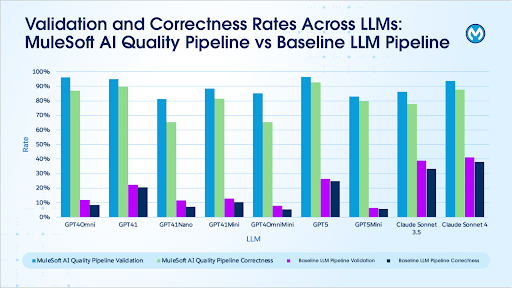
All of this comes at no additional cost, with a native MCP tool integration tuned for MuleSoft development and will be continuously upgraded as part of the broader release updates to Anypoint Code Builder.
Key capabilities of MuleSoft’s Dev Agent
We’ll take a look at the following six capabilities you’ll get with MuleSoft Dev Agent.
- Out-of-the-box MCP tools
- Auto-approve settings
- Plan vs. act modes
- Context awareness and task management
- Global and workspace rules
- A developer experience designed for MuleSoft
1. Out-of-the-box MCP tools
Once you install ACB, the MuleSoft MCP server is auto-configured. You don’t need to manually wire up endpoints or edit configs.
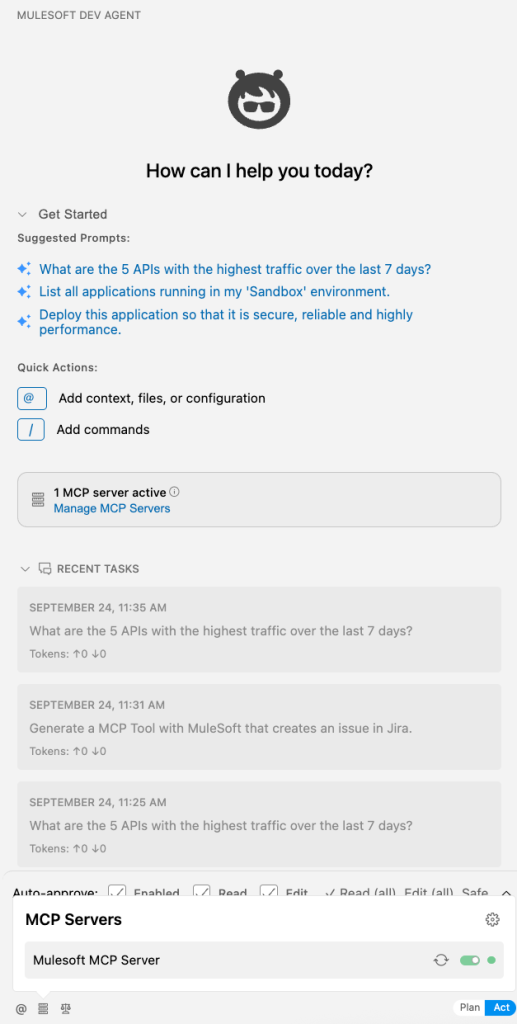
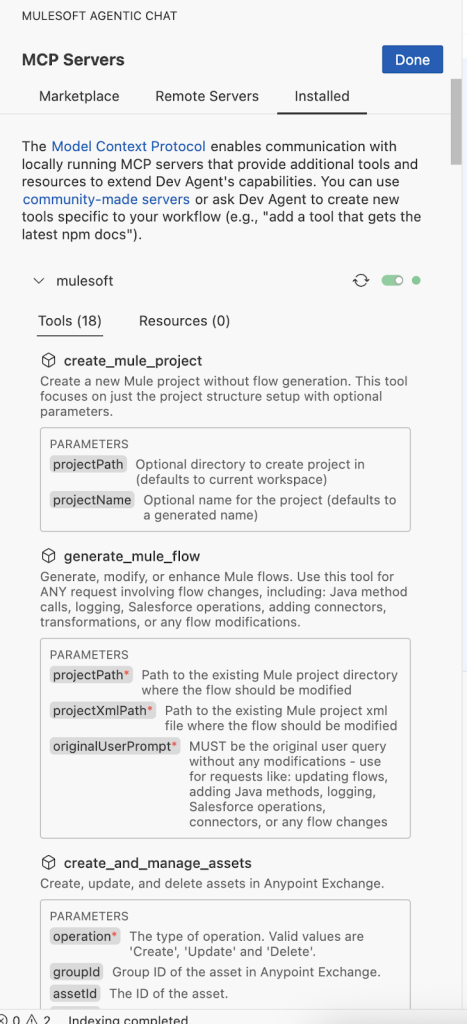
2. Auto-approve settings
To reduce friction, the Dev Agent introduces auto-approve modes. You can enable auto-approve globally, allow read-only or edit access, limit approvals to safe commands, and cap requests with configurable limits.

3. Plan vs. act modes
Dev Agent can operate in two distinct modes:
- Plan mode: Dev Agent gathers information and drafts a step-by-step plan before making changes.
- Act mode: Dev Agent executes the requested task immediately.


4. Context awareness and task management
Dev Agent tracks context window size and shows a progress bar so you know how much memory is left. When the context is full, it automatically starts a new task to avoid losing important information. You can also call @context explicitly to manage memory, making workflows more predictable.

5. Global and workspace rules
Set global rules that apply across all projects (e.g. always auto-approve safe commands) or create workspace-specific rules for individual projects. This allows team-wide consistency while leaving room for flexibility in specialized apps.

6. A developer experience designed for MuleSoft
The home screen of the agent in ACB makes onboarding simple. It includes a guided tour to explore capabilities and a snapshot of active MCP servers and recent tasks.
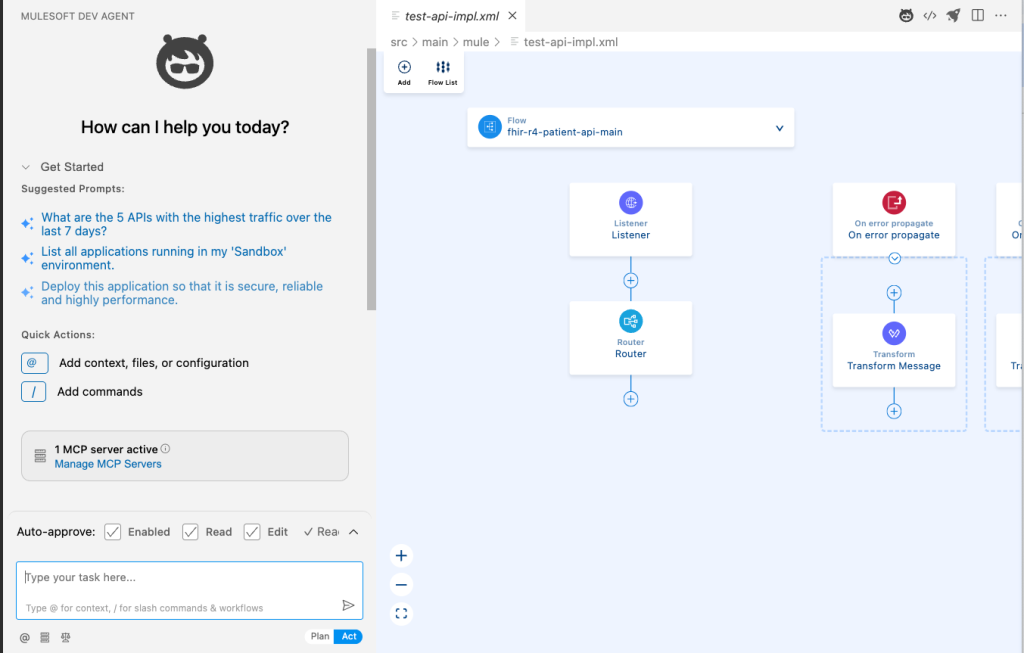
Exploring MCP tools with MuleSoft Dev Agent
The MuleSoft Dev Agent is tightly integrated with the MuleSoft MCP Server, which provides a rich set of tools to simplify and automate development workflows. You can explore the full list of tools in the official MuleSoft MCP Server documentation.
Let’s walk through an example of how to create and build a mule project with the Dev Agent. This feature allows you to scaffold, configure, and build a complete Mule project directly from natural language instructions.
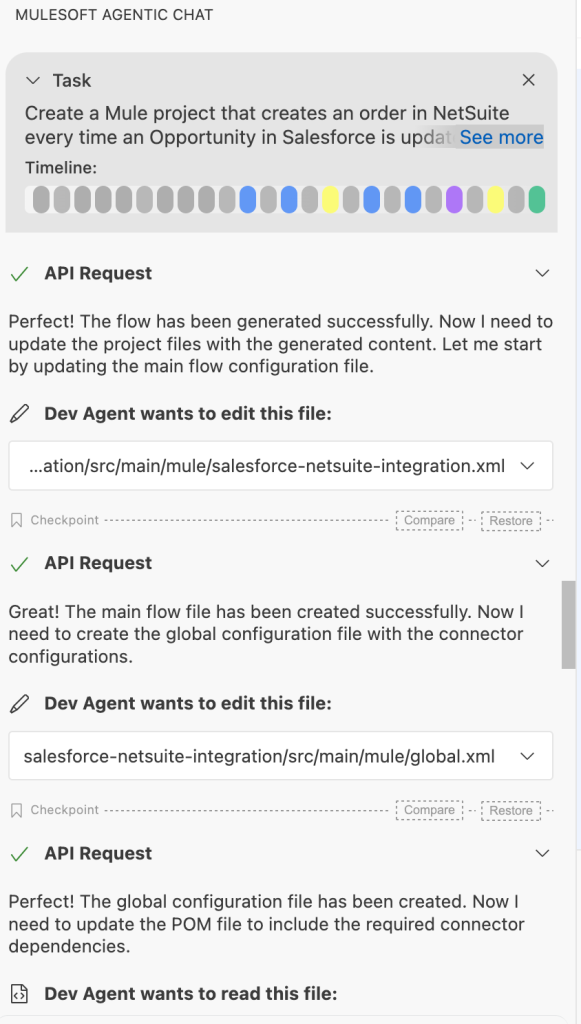
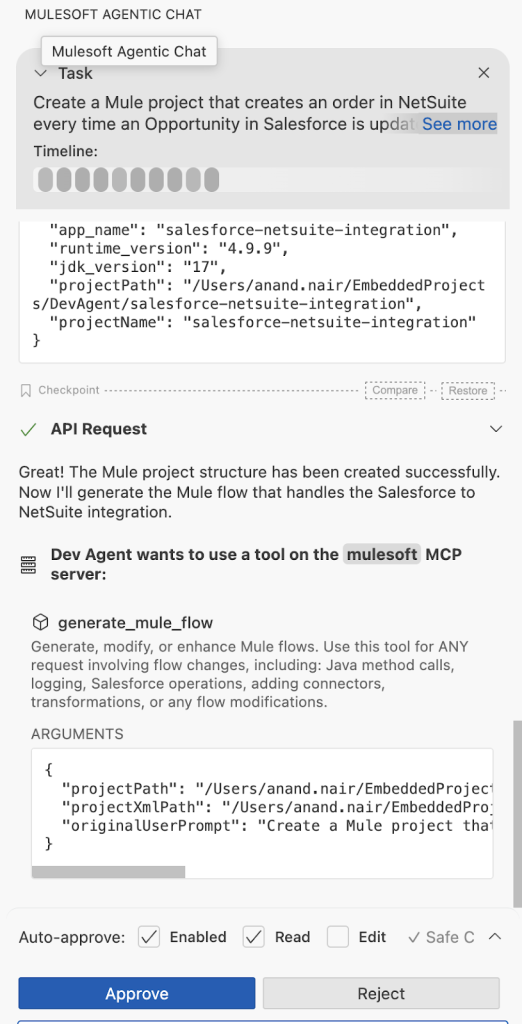

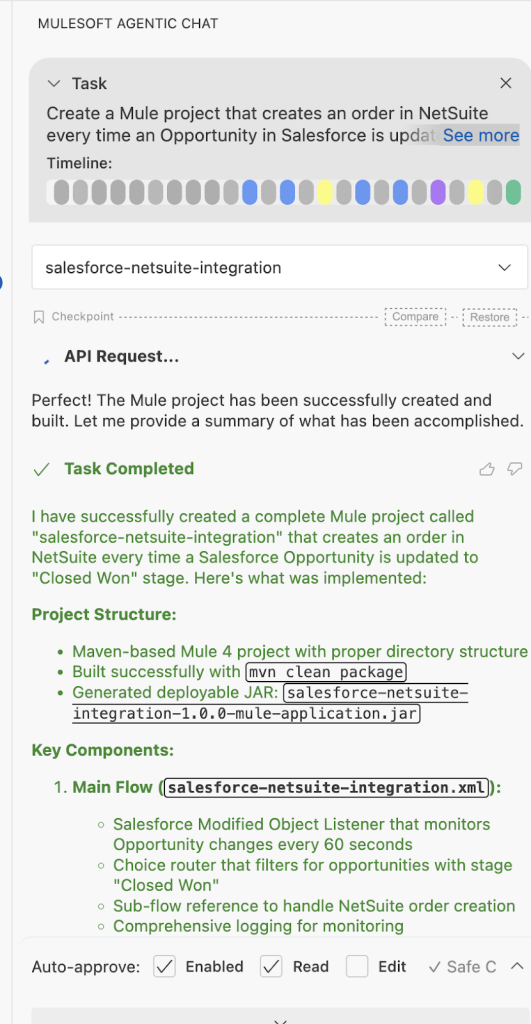
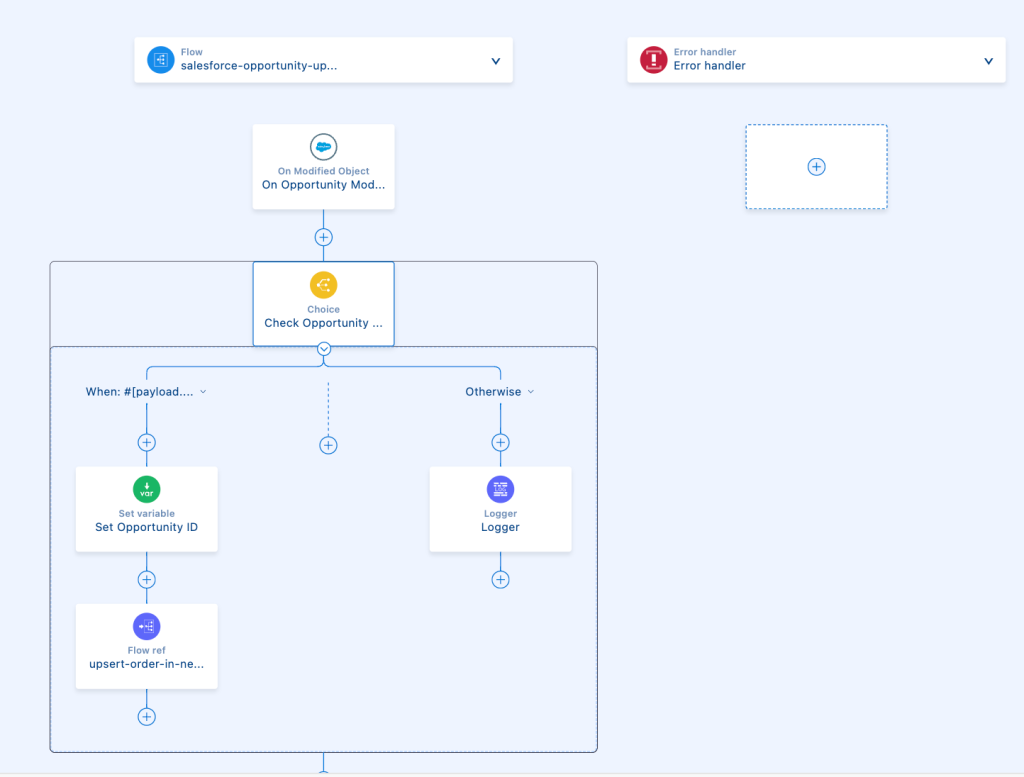
Why Dev Agent matters for developers
With MuleSoft’s Dev Agent, you get:
- Frictionless setup: Auto-configured servers, auto-updates
- Enterprise-grade safety: Auto-approve with configurable permissions
- Smarter task handling: Plan vs. act, context awareness
- Cost savings: It’s free, and there’s no subscription required)
It’s everything you’d expect from a premium agent like Cursor – but tuned specifically for MuleSoft projects and available to every ACB user for free.
Another thing to consider is MuleSoft AI Quality pipeline. By grounding AI prompts in proprietary data, validating outputs with IDE-integrated checks, applying error correction, and using an LLM judge to evaluate correctness, MuleSoft has developed a proprietary data pipeline for our generative responses that Dev Agent leverages. With this pipeline, Dev Agent consistently produces integration flows that are both valid (syntactically accurate) and correct (produce results that fulfill the prompted use case).
In testing, MuleSoft’s pipeline achieved ~90% validity and ~80% correctness compared to ~20% and ~17% for baseline LLM calls, where a baseline LLM reflects off-the-shelf code generation from direct prompting of models like GPT4, GPT5, Claude Sonnet 4, and so on.

At its core, we’re a platform for the most innovative builders in the industry, who create business critical applications that power some of the most tightly regulated industries like banking, healthcare and public sector. If our customers are going to be using AI as part of their workflow then bloat, inconsistency and hallucinations? It’s a non-starter.
The MuleSoft AI Quality pipeline makes Dev Agent the best suited AI tool for MuleSoft development; it provides customers with trusted, production-ready output at enterprise scale, helping deliver faster outcomes with confidence.
MuleSoft Dev Agent is everything you want and so much more
MuleSoft Dev Agent is more than just a chat interface; it’s an AI-native development experience built into Anypoint Code Builder. With auto-configured MCP tools, plan/act flexibility, context management, and enterprise-ready safety controls, it helps developers work smarter, faster, and more securely.
To learn more, watch a demo of MuleSoft Dev Agent.









